Lessons from Gulam: Asian Music in Bradford - Documentary ...
Lessons from Gulam: Asian Music in Bradford - Documentary ...
Lessons from Gulam: Asian Music in Bradford - Documentary ...
You also want an ePaper? Increase the reach of your titles
YUMPU automatically turns print PDFs into web optimized ePapers that Google loves.
D O C U M E N T A R Y E D U C A T I O N A L R E S O U R C E S study guide<br />
sometimes encounter, and offers solutions to<br />
those problems. Thus at a quite abstract level<br />
the film is itself an exegesis and an argument.<br />
Before go<strong>in</strong>g to <strong>Bradford</strong> I speculated on the<br />
possibility of mak<strong>in</strong>g a film about Indipop, a<br />
modem genre of popular music that is a blend<br />
of <strong>Asian</strong> and Western musical elements, th<strong>in</strong>k<strong>in</strong>g<br />
to use this as a metaphor of wider processes<br />
of cultural synthesis, but for various reasons<br />
this goal rema<strong>in</strong>ed unfulfilled. I also wanted<br />
to make this an issue film, <strong>in</strong> contrast to a film<br />
portrait, and <strong>in</strong> this respect I have only been<br />
partly successful, for <strong>in</strong> many ways the f<strong>in</strong>al<br />
film is a portrait, or rather a double portrait.<br />
It was also <strong>in</strong>tended <strong>from</strong> the outset that the<br />
mak<strong>in</strong>g of the film should be the occasion for<br />
conduct<strong>in</strong>g a legitimate piece of field research,<br />
with the hope of captur<strong>in</strong>g the sense of exploration<br />
and revelation that accompanies fieldwork.<br />
In the event, the film came to be a study<br />
of a key element <strong>in</strong> any music culture, musical<br />
enculturation; the processes through which<br />
people develop their <strong>in</strong>herent musical abilities<br />
and learn specific musical skills. The film does<br />
this by show<strong>in</strong>g people learn<strong>in</strong>g and practis<strong>in</strong>g<br />
music <strong>in</strong> a variety of contexts, contrast<strong>in</strong>g<br />
what goes on <strong>in</strong> the <strong>in</strong>formal sett<strong>in</strong>g of the<br />
home with the more formal school situation.<br />
II. RESEARCH IN BRADFORD<br />
In the mid-1980s the population of the <strong>Bradford</strong><br />
Metropolitan Area was about 350,000,<br />
of which perhaps 60,000 were <strong>Asian</strong>*. Cities<br />
<strong>in</strong> modem Brita<strong>in</strong> vary widely with respect to<br />
the relative proortions of the various m<strong>in</strong>ority<br />
communities. In <strong>Bradford</strong>, Muslim <strong>Asian</strong>s<br />
predom<strong>in</strong>ate; H<strong>in</strong>du and Sikh communities are<br />
comparatively small, and there are few West<br />
Indians. With<strong>in</strong> the Muslim community of<br />
<strong>Bradford</strong> the majority have come <strong>from</strong> Pakistan,<br />
especially <strong>from</strong> the Mirpur district of<br />
Azad Kashmir (60-70% of the Pakistanis are<br />
Mirpuris, accord<strong>in</strong>g to Khan 1977:57). There<br />
GUIDE: <strong>Lessons</strong> <strong>from</strong> <strong>Gulam</strong> 2<br />
is also a much smaller Muslim community<br />
<strong>from</strong> Gujarat, <strong>in</strong> India, most of whose members<br />
are “secondary immigrants”, who came to<br />
Brita<strong>in</strong> <strong>from</strong> various East African countries <strong>in</strong><br />
the late 1960s. In many cases they left Africa<br />
under duress, feel<strong>in</strong>g threatened by policies of<br />
Africanization as countries like Kenya, Tanzania<br />
and Uganda became <strong>in</strong>dependent <strong>from</strong><br />
Brita<strong>in</strong>. For reasons expla<strong>in</strong>ed below, most of<br />
the people I worked with <strong>in</strong> <strong>Bradford</strong> were<br />
<strong>from</strong> this Gujarati community.<br />
The former considerable wealth of <strong>Bradford</strong><br />
was founded on the textile <strong>in</strong>dustry. Pakistanis<br />
started com<strong>in</strong>g to <strong>Bradford</strong> <strong>in</strong> significant numbers<br />
<strong>from</strong> the early 1950s, and were actively<br />
recruited <strong>in</strong> Pakistan by agents for the various<br />
textile mills, which needed cheap labour.<br />
Thirty years later the community was well settled,<br />
though the textile <strong>in</strong>dustry had entered a<br />
state of decl<strong>in</strong>e. The Gujaratis came later, and<br />
to some extent rema<strong>in</strong>ed distanced <strong>from</strong> their<br />
Pakistani co-religionists, by language, and the<br />
region of the sub-cont<strong>in</strong>ent to which they felt<br />
connected. Large areas of the city of <strong>Bradford</strong>





